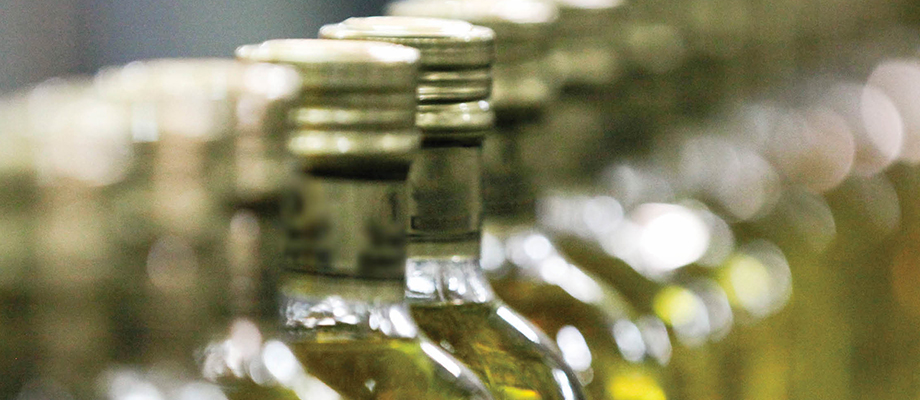More per drop: Building resilience and adding value in Morocco’s Olive Oil Sector

How best to pivot Morocco’s olive oil sector to adapt to the changing climate and leverage new opportunities in quality oil markets: two main topics discussed this week during a roundtable organized by the EBRD and FAO as a side event at the 16th Edition of Morocco’s International Agricultural Exhibition (SIAM) on Climate Change and Agriculture in Meknes.
Quenching a thirst for olive oil
Morocco’s agricultural sector is on the frontline of climate change. The country is experiencing a prolonged and severe drought that has seen rainfall drop to below 70% average in the last six years. Yet despite these challenges, olive oil producers are busy planting the seeds of a resilient climate-smart future thanks to a longstanding collaboration through a jointly implemented project between the EBRD, FAO, the Ministry of Agriculture, Maritime Fisheries, Rural Development, Water and Forests, and Interprolive – a Moroccan Interprofessional Olive Federation which represents and advocates for its members.
The takeaway message to the public and private sector representatives who joined the international roundtable organized at SIAM 2024 was that a resilient future for the industry is still possible if the right investments and capacity development are urgently delivered.
“It is critical to prioritize investments and support stakeholders through innovative technologies and techniques to enhance water management that make every drop count,” said Iride Ceccacci, Head of Advisory, Agribusiness, the EBRD. “We are seeing in the countries where the EBRD is investing across the SEMED region, that olive oil is an example of a sector that can thrive even with the severe water scarcity it faces. This includes Morocco where, as highlighted in the policy brief which identified commercial and consumption patterns derived from extensive field studies, olive oil is a critically important sector. Production accounted for about 5 percent of global production in 2021 and accounts for 13% of all workdays in agriculture and 19% of its food oil requirements.”
Root and branch olive sector reform
The roundtable opened with remarks from Redouane Arrach, Secretary General of the Ministry of Agriculture, Fisheries, Rural Development, Water and Forests, who highlighted the opportunities of investing in the sector even in the challenging context of water scarcity, heat, and pest outbreaks, to boost olive oil production in the country.
A panel discussion followed on how to improve and deploy water management strategies that are tailored to the challenges that olive oil production is facing. These include water reuse, efficient irrigation systems, and adaptive deficit irrigation methods that only target vulnerable growth stages. While production has significantly expanded through the Green Morocco plan and Generation Green in terms of area, water scarcity has been a major factor in keeping productivity per hectare static.
“To effectively cope with projected climate changes and their impact on water availability, sector stakeholders and decision-makers in Morocco must plan timely adaptation strategies for both the short- and long-term for a warmer and drier future” explained Lisa Paglietti, Economist, FAO. “These strategies will help the country collectively strengthen a high level of competitive advantage for the olive oil sector, capable of enduring over time.”
How best to address market competition and meet quality standards was at the heart of the second panel discussion. Panellists examined ways to implement food safety and environmental certification, labelling and traceability systems to help build domestic and international markets, including through enhancing standards and mechanisms to differentiate various olive oil qualities, which can contribute to higher value and enhance incomes of smallholder farmers, SMEs, and other stakeholders.
A bright future for a green olive oil sector, rooted in a strong legacy
This roundtable was the culmination of a joint EBRD/FAO project that started in 2012. It subsequently sprouted into multiple projects in Jordan, Morocco, Tunisia, and West Bank and Gaza to build resilience and competitiveness in the olive oil sector across the region. Activities have included developing the capacity of hundreds of industry stakeholders on best practices in olive oil production, processing, quality enhancement and assurance, and marketing. It has also promoted awareness among consumers about the attributes of high-quality, extra virgin olive oil and its health benefits.
In Morocco specifically, training has targeted improving quality, efficiency and food safety measures across the supply chain including approaches to anticipate and mitigate losses caused by Xylella fastidiosa – a bacterial plant disease that can devastate olive trees and production. Among other activities, study tours to Portugal and Italy have provided an opportunity to see how public and private investment, modern production techniques, traceability systems and quality standards can make a competitive difference.
“Collaborating on this EBRD/FAO project has enabled us to take a whole value chain collaborative approach to expand our olive oil sector,” explained Rachid Benali, President, Interprolive. “We are also supporting the Ministry to devise and implement policy recommendations to guide future sector strategies in Morocco. Insights gained on effective practices and investment prioritization will also support the broader MENA region in adapting olive oil production to today’s dry realities.”
All project activities can be viewed on Agtivate.org.
